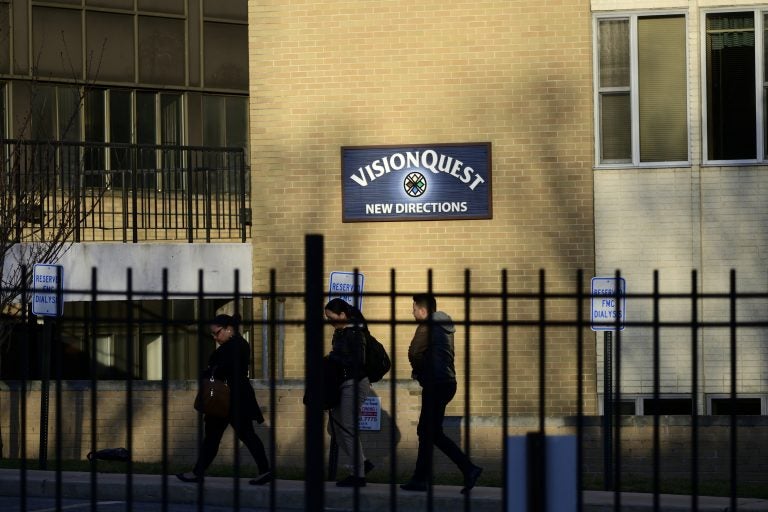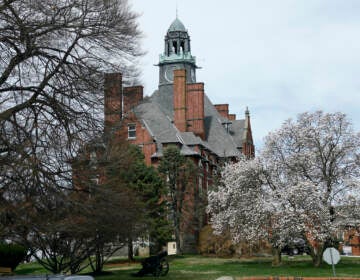Embattled North Philly immigrant youth center can open, judge says
A Common Pleas court judge has cleared the way for a controversial facility to house immigrant minors to open in North Philadelphia.

Several VisionQuest employees are seen departing in small groups from the North Broad Streetlocation to join other employees and members of the community at a March 2019 meeting at the nearby Old York House. (Bastiaan Slabbers for WHYY)
A Common Pleas court judge has cleared the way for a controversial facility to house immigrant minors to open in North Philadelphia.
VisionQuest, an Arizona-based youth services company, had requested an emergency stay to begin accepting unaccompanied immigrant boys between the ages of 12 and 17 arriving at the U.S.-Mexico border.
Plans to start receiving minors at the Grace Dix Center at 5201 Old York Road were derailed in January, when the Philadelphia Department of Licenses and Inspections issued a notice of violation. The Philadelphia Zoning Board of Adjustments later upheld the notice, which said the center failed to seek the correct permit to open.
Judge Paula Patrick’s decision stays the board’s ruling and criticizes the city’s reasoning, as “arbitrary” and “capricious.”
“We’re very happy with today’s ruling,” said VisionQuest CEO Mark Contento. “While we are disappointed it took this long to begin our program, we are looking forward to finally being able to begin serving this population of children in need.” The company previously estimated that it would take a couple of weeks for doors to open following a decision.
Attorneys for Philadelphia are weighing whether to challenge the decision.
“We disagree with the court’s ruling,” said City spokesman Mike Dunn. “The city stands by our contention that Visionquest’s proposed use of 5201 Old York Road is disallowed under its 2010 zoning permit.”
The fight over the facility — ostensibly about zoning — touches on a number of hot-button issues: immigration, child welfare, and NIMBYism, among others.
Advocates for immigrants’ rights say the center is a part of a federal immigrant detention system that locks up immigrants in inhumane conditions.
“The court’s decision to allow this for-profit business to open a child detention center in our city is appalling,” said Miguel Andrade, communications manager for Juntos, an immigrant advocacy organization in South Philadelphia.
Neighbors criticized the company’s track record at a community meeting in March, underscoring a tense relationship between VisionQuest and the city’s Department of Human Services, which used to contract with the company for services.
In 2017, Philadelphia DHS shut down intake to a VisionQuest program formerly located in the same Old York Road building, after reports that staff had verbally and physically abused children in their care.
Current VisionQuest employees have also sounded the alarm about a bullying culture in the company which, combined with insufficient training for staff at the center, makes it unsafe for children, they told WHYY last month.
Director James Smith denied those accusations. In addition to appealing the zoning decision, VisionQuest filed a complaint in federal court, alleging the city has discriminated against Latinos.
In appeals to the community and in court documents, VisionQuest has repeatedly argued that children will suffer harm if they are not able to move in to the center, and that the permission they obtained to run a youth residential center in the same location in 2010 is still valid.
“These children are dying,” said VisionQuest lawyer Leslie Gerstein, connecting Philadelphia to the ongoing humanitarian crisis at the U.S.-Mexico border, where thousands of family arrivals and minors traveling alone have stressed the network of short-term shelters there.
After a 2,000 mile journey, “the city is saying we can’t give these children a home,” Gerstein told the court during oral arguments.
Private providers, such as VisionQuest, house unaccompanied immigrant youth on behalf of the U.S. Office of Refugee Resettlement. The rapid rise in the number of families and children, primarily from Central America, arriving at the U.S. southern border has increased demand for their services.
Attorneys with the city’s law department have pushed back against those claims with a procedural argument: that VisionQuest is doing something different than it was before, and thus needs to file for a new permit or exception.
City advocates pointed to a single line in VisionQuest’s zoning permit for the building, issued in 2010 — that children there should not be “under the jurisdiction” of a court.
Patrick, a former family court judge, rejected the idea that the company was doing anything new in transitioning the building from a facility for adjudicated youth, to one where immigrant children live while going through proceedings in immigration court.
“Any time children are in a facility, they’re put there by the court,” said Patrick, who added she herself had sent children to VisionQuest’s earlier facility.
In response to concerns about VisionQuest’s track record of mistreatment, Patrick appointed retired Common Pleas Court Judge Paul Panepinto as “special master.”
The order instructs Panepinto to help the two sides resolve their differences, “facilitate and oversee the orderly process of the youth transitioning to the property,” and to “ensure the highest quality of care of the youth.”
During the hearing, Patrick repeatedly referenced the idea that the conflict is not about zoning at all, but is a proxy for some other political or philosophical disagreement.
“The law should apply to everyone,” she countered, regardless of one’s views on U.S. immigration policy.
VQ CCP Decision by on Scribd
WHYY is your source for fact-based, in-depth journalism and information. As a nonprofit organization, we rely on financial support from readers like you. Please give today.



